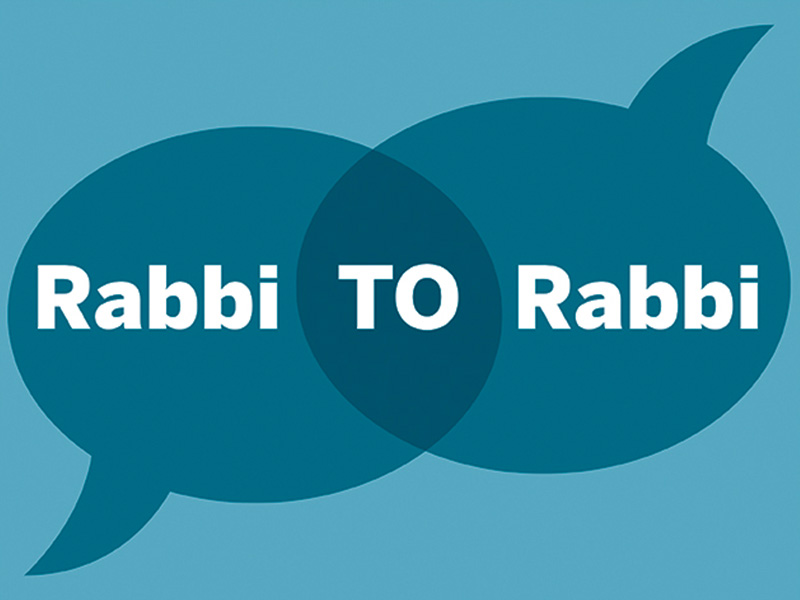Diversity of thought and opinion should be welcomed, Rabbi Mark Fishman, spiritual leader of Congregation Beth Tikvah in Montreal told Rabbi Yael Splansky of Holy Blossom Temple and some 100 people who had gathered at the Reform temple for an evening of dialogue between these two senior rabbis.
“Differences can be celebrated,” said Rabbi Fishman, who is Orthodox. “We should not be divided over the things we cannot agree on. Each of us has to know who we are and become that in the fullest sense of possibility, so differences are OK.
“How we care for the other and how we treat the other who’s different than us is the key.”
The two rabbis had been corresponding by email for two years on a variety of religious and other topics and appearing monthly in the CJN column Rabbi 2 Rabbi.
The weekly series features a dialogue between two rabbis from different denominations and different cities (Montreal and Toronto) that rotates between four different pairs of clergy.
READ: TWO RABBIS WALK INTO A SYNAGOGUE…
On March 10, the column came alive as Rabbis Splansky and Fishman held a dialogue in real time on a variety of texts. The two rabbis had never met until this week.
Each one had chosen texts that would keep them interested if they were ever stranded on a desert island. The evening was moderated by CJN editor Yoni Goldstein, who dreamed up the Rabbi 2 Rabbi series.
Goldstein said he thought these dialogues would help readers get a sense of the rabbinical mindset and show how rabbis interact with each other. Naysayers didn’t think he would be able to find a group of rabbis who would be interested in opening themselves up and engaging in these dialogues.

“What’s special about this grouping over the two years is the camaraderie that has developed… To have two people with differences of opinion focus on what they have in common is something you don’t see often. It’s very gratifying to see it monthly in The CJN.”
Rabbi Fishman likened his participation in Rabbi 2 Rabbi to a study partnership. “I have learned a tremendous amount from Rabbi Splansky from a Jewish study perspective.”
Rabbi Splansky, in turn, thanked Goldstein for “pushing boundaries and building bridges.”
This kind of dialogue is rare, she said. “It’s hard in Toronto for rabbis of different denominations to speak honestly. Things are changing thanks to this CJN platform.”
She said she, too, enjoyed studying with a peer. “You don’t study Torah alone. It’s meant to be studied in partnership.”
One of the desert island texts Rabbi Fishman’s chose a was in Genesis, Chapter 3, verses 11 to 12, when God asked Adam if he had eaten from the tree of knowledge, and Adam blamed his transgression on Eve.
Rabbi Fishman called Adam and Eve are “a paradigm for humanity.” Adam had “blown it” and could no longer live in paradise because he had not taken responsibility for his actions. “To err is to be human… We make mistakes all the time. It’s OK if we can learn from them. Taking responsibility is very important. There’s better chance for a relationship to be sustained if you take responsibility.”
Rabbi Splansky offered another interpretation: “What if Adam was afraid of the God who made the world? Maybe God could have done more for Adam to be less afraid.”
“That’s a stunning question,” Rabbi Fishman replied. “I’ll need months [to study it].”
But he disagreed with Rabbi Splansky’s interpretation of Genesis 39:1. She said Abraham is drawn to the burning palace that “is radiating God’s glory” because he’s a “spiritual seeker.” **** See comments below re: this quote. (ed.)
READ: INSPIRATIONAL BOOKS FOR THE BEACH
“The flames are too religious for my liking – too frummy,” Rabbi Fishman said. “I like the picture of Abraham seen in glow of the palace… I just don’t think that the Abraham of Lech Lecha.”
Rabbi Splansky also provided another interpretation of this text: when Abraham saw the palace on fire, he recognized danger and took charge of the rescue and repairing the damage. “He is a “champion of justice” rather than a “spiritual seeker.”
This view of Abraham is closer to that of Rabbi Fishman: he sees God urging Abraham to repair the world. “The fire is the breakdown of society,” and God directs him to create a society that can function. “We need each other to fix the mess humankind has made.”








